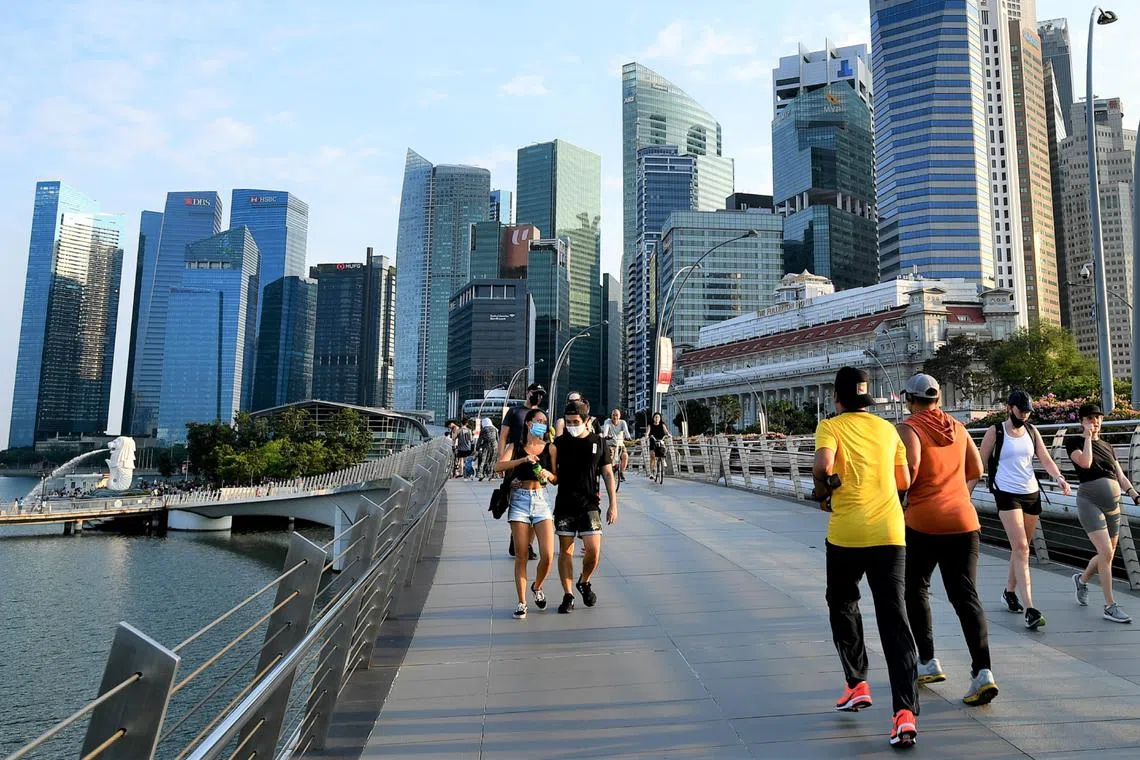Singapore moves up 2 spots to top world ranking on government effectiveness
Sign up now: Get ST's newsletters delivered to your inbox

Singapore was ranked 11th in rule of law, No. 4 in ethical leadership, and No. 2 in property rights.
PHOTO: ST FILE
SINGAPORE - Singapore has come out tops in a ranking that tracks the effectiveness of governments around the world, edging out Finland, which has topped the index since it was first published in 2021.
What pushed Singapore up from third place on the annual Chandler Good Government Index in the past two editions to the first spot in 2023 was its performance in the pillars of leadership and foresight, strong institutions, financial stewardship, attractive marketplace and helping people rise.
But the Republic fared slightly worse in the two pillars of robust laws and policies, and global influence and reputation,
The Chandler Institute of Governance said its report this year – its third – offers a special focus on how the pillars of good government stand together in the face of a polycrisis, which it defined as a cluster of global crises that interact to produce harms greater than each crisis would individually produce.
The mix of a deadly pandemic, bloody war and rampant inflation shone a spotlight on governments that have had to cope with relentless change and uncertainty while maintaining stability and adapting effectively, added the institute, a non-profit organisation headquartered in Singapore.
It said Singapore’s Government was able to deliver during turbulent times as it had improved in the areas of implementation, strategic prioritisation and innovation.
Singapore’s response to the Covid-19 pandemic was laudable, the economy surpassed its pre-crisis levels.
Coming after Singapore in the top 10 were Switzerland, Finland, Denmark, Norway, Sweden, the Netherlands, Germany, the United Kingdom and New Zealand.
Singapore, Finland, and Norway showed the strongest capacity to manage the risks posed by the polycrisis, said the institute, noting that well-governed countries are more likely to have developed greater resilience to prepare for such crises.
The index examines how public institutions come together to prepare for crises, how governments are confronting inflation while sustaining good jobs, and how governments are building more inclusive communities
Countries are scored on 35 indicators organised into the seven pillars.
It taps more than 50 publicly available global data sources, including from the United Nations, World Trade Organisation, World Justice Project and Yale University.
The institute said the most reliable predictors of overall good governance are the indicators capturing the rule of law, ethical leadership and property rights. This was also true for the 2022 and 2021 data, illustrating how fundamental these three components of government are to delivering effective governance, it added.
A total of 104 countries – representing about 90 per cent of the world’s population – were evaluated.
Singapore was ranked 11th in rule of law, No. 4 in ethical leadership, and No. 2 in property rights.
Good government is also closely correlated with several important outcomes that are national goals and priorities for many countries, such as reducing extreme inequality,
Mr Christian Bason, chief executive officer of the Danish Design Centre and a member of the index’s global advisory panel, said the enduring key role of ethical leadership points to the responsibility of public decision-makers to uphold high standards of integrity and to empathise with the citizens and societies they work for.
He added: “Ethical leadership should, however, also be seen in the wider context of leadership and foresight. Perhaps most important at a time of polycrisis is the ability to collaboratively foster new visions of what a good society looks like. After all, if you can imagine it, then you can design it.”
In 2023, Asian countries including Japan, Vietnam, Indonesia, China, Cambodia and South Korea made gains on the index, demonstrating improved public-sector capabilities and performance, said the institute.
Middle-income countries also experienced the greatest movement on the index, with Vietnam, North Macedonia, the Kyrgyz Republic and Kenya showing the biggest improvements.
Mr Wu Wei Neng, executive director of the institute, which works with governments through training programmes and projects, said the index’s methodology focuses on technocratic capabilities and skills, rather than political ideologies.
“We want the index to be a practical tool to support more effective governance and public service delivery for all countries, regardless of their system of government or income level. It is encouraging to see positive movement in the rankings among middle-income countries, and a number of countries in Asia,” he added.



